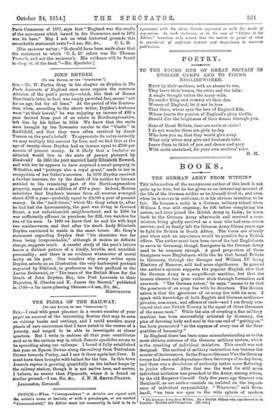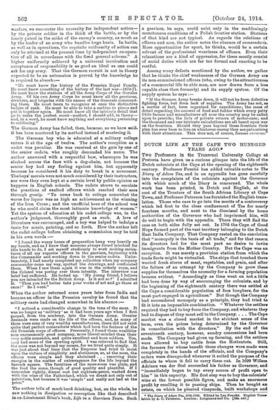BOOKS.
THE GERMAN ARMY FROM WITHIN.*
THE information of the anonymous author of this book is not quite up to date, but he has given us an interesting account of the life of the German soldier as he himself lived it ; and even when he is severe in criticism, it is his obvious intention to be fair. He became a cadet in a German military school when William I. was still reigning; he left before completing his course, and later joined the British Army in India; he came back to the German Army afterwards and received a com- mission, being gladly received as a man who had seen active service; and be finally left the German Army fifteen years ago to fight for Britain in South Africa. The times are already past when such an experience would be possible for a British officer. The author must have been one of the last Englishmen to serve in Germany, though foreigners in the German Army used to be common enough. A good proportion of these foreigners were Englishmen while the tie that bound Britain to Germany, through the Georges and William IV. being Electors of Hanover, still had some significance. In general the author's opinion supports the popular English view that the German Army is a magnificent machine, but that the human element has gone rather stale through formalism and overwork. " The German axiom," he says, " seems to be that the greatness of an army lies with its directors. The British axiom is that the greatness of an army lies with its men. I speak with knowledge of both English and German soldiers— privates, non-cons., and officers of rank—and I am firmly con- vinced that one British Tommy is the equal of three Germans of the same rank." While the aim of creating a fine military machine has been successfully achieved by Germany, the plan of devoting body and soul to the one end of "getting on" has been prosecuted " at the expense of every one of the finer qualities of humanity."
In England there has been some misunderstanding as to the most obvious outcome of the German military system, which is the crushing of individual initiative. This result was not designed. The method of military instruction has become the master of its inventors. In the Franco-German War the German troops had more self-dependence than the troops of to-day have, and there was a devolution of authority rather more flattering to junior officers. After that war the need for still more individual initiative was preached to the Army, among others, by the old Emperor himself. Only five years ago General von Bernhardi, as our author reminds us, insisted on the import- ance of individual responsibility. "Wherever," said Bern- hardi, "we turn our eyes to the wide sphere of modern
• The German A rrny from Within. By a British Officer who has Served in it. London : Hodder and Stoughton. [2s. net.]
warfare, we encounter the necessity for independent action— by the private soldier in the thick of the battle, or by the lonely patrol in the midst of the enemy's country, as much as by the leader of an army who handles huge hosts. In battle, as well as in operations, the requisite uniformity of action can only be attained at the present time by independent co-opera- tion of all in accordance with the fixed general scheme." A higher uniformity achieved by a universal inculcation and acceptance of responsibility is as good an ideal as one could ask for any army. That the German recruit is not in theory expected to be an automaton is proved by the knowledge he is required to absorb :—
"Ho must know the history of the Prussian Royal Family. He must know something of the history of the last war-1870-71. He must know the stations of all the Army Corps of the German Army. Of his own Army Corps he must know all the garrisons, divisions, and brigades with the names of the Generals command- ing them. He must learn to recognise at once the distinctive badges of rank. He must be able to take a carbine to pieces and put it together again. He must know all the intricate detail that go to make the perfect scout—perfect, I should add, in theory— and, in a word, he must know anything and everything pertaining to soldiering."
The German Army has failed, then, because, as we have said, it has been mastered by its method instead of mastering it.
The German boy who is educated at a military college enters it at the age of twelve. The author's reception as a cadet was peculiar. He was received at the gate by one of the senior cadets, who roughly demanded his name. The author answered with a respectful bow, whereupon he was slashed across the face with a dog-chain, not because the senior boy had any feeling against him, but apparently because he considered it his duty to break in a newcomer. The boys' morals were not much considered by their instructors, nor were they even kept at a certain level by public opinion as happens in English schools. The cadets strove to emulate the practices of exalted officers which reached their ears through gossip. "To come back to college somewhat the worse for liquor was as high an achievement as the winning of the Iron Cross ; and the unofficial hero of the school was he who could claim the most intimate knowledge of women." Yet the system of education at his cadet college was, in the author's judgment, thoroughly good as such. A love of literature was encouraged, and a boy was helped to indulge a taste for music, painting, and so forth. How the author left the cadet college before obtaining a commission may be told in his own words :-
" I found the weary hours of preparation hang very heavily on my hands, and as I knew that someone always found mischief for idle hands to do, I set myself studiously to work making carica- tures of all my superior officers in the garrison, beginning with the Commander and working down to the senior cadets. Unfor- tunately, I had nearly completed my collection when my company commander came my way, spotted the drawings, and confiscated them. When I saw them again it was in the orderly room, and the Colonel was poring over them intently. The interview was brief but sufficient. He looked up. g My young friend, I believe you are intended for the British Army. Is it not so P I admitted it. Then you had better take your works of art and go there at once!' So I went."
When the author returned some years later from India and became an officer in the Prussian cavalry he found that the military caste had changed somewhat in his absence :—
"I noticed a considerable change in the tone of the meas. It was no longer as military' as it had been years ago when I first peeped, from the academy, into the German Army. Greater demands were made on the life of the officers, and, as many of them were sons of very wealthy manufacturers, there did not exist quite that perfect camaraderie which had been the feature of the old Prussian corps of officers. Personally, I found these wealthier men uncommonly good company, more liberal-minded than their very noble comrades, and quite excellent and keen soldiers. Too, til_ey had more of the sporting spirit. I was relieved to find that the mess was not beyond my means, for we lived quite simply. It was just about that time that the Emperor had tried to insist upon the virtues of simplicity and abstinence, so, at the mess, the officers were simple and they abstained . . . reserving their energies in the matter of extravagance for the life beyond the barrack square. The furniture of the mess-room was plain, and the food the same, though of good quality and plentiful. If I remember rightly, dinner cost but eighteen-pence, washed down with the wine of the Fatherland, which we drank not only out of patriotism, but because it was 'simple' and really not bad at the price."
The author tells of much hard drinking, but, on the whole, he saw nothing in dissipation or corruption like that described in ex-Lieutenant Mises book, Life in a Garrison Town. Such
a garrison, he says, could exist only in the maddeningly monotonous conditions of a Polish frontier station. Stations
of that kind are not typical. As regards the relations of officers and men, the author notes the absence of camaraderie.
More opportunities for sport, he thinks, would be a certain solvent of the professional weariness of officers. Even their relaxations are a kind of oppression, for these mostly consist of social duties which are far too formal and exacting to be restful.
Among many defects mentioned by the author, we gather that he thinks the chief weaknesses of the German Army are its non-commissioned officers (who, owing to the attractiveness of a commercial life to able men, are now drawn from a less capable class than formerly) and its supply system. Of the
supply system he says :— " If the German Army breaks down, it will not be from defective fighting force, but from lack of supplies. The Army has not, as a matter of fact, been organised for expeditions; the mass of detail regarding the amount of food and fodder which every petty little farmer and manufacturer all over the country may be called upon to provide ; the lists of private owners of motor-cars; and the thousand and one intricate calculations are all based upon war on the frontiers. Should they pass beyond these frontiers their plan has ever been to live on whichever enemy they are patronising with their attentions. This does not, of course, foresee reverses.



































 Previous page
Previous page